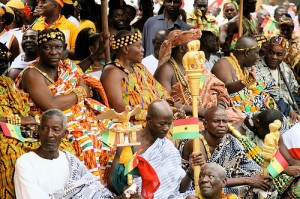Appoint 30% chiefs to local assemblies – Prof. Ansu-Kyeremeh

Professor Kwasi Ansu-Kyeremeh, a former Director of the Department of Communication Studies, University of Ghana, has reiterated the need for 30 per cent representation of chiefs at the local assemblies in order to contribute their quota towards strengthening the local governance system.
Prof. Ansu-Kyeremeh, also known as Nana Fobi Kropa II, Atwima Apremanimhene in the Ashanti Region, said although the Local Governance Act required chiefs to be consulted in the appointment of 30 per cent of people to the local assemblies.
However, he said since his enstoolment as a chief over the past 13 years, he had never been consulted in the appointment of people to the local assemblies and believed the outcome of the proposed amendment to some provisions in the Constitution would enhance multi-party democracy in the country.
Prof. Ansu-Kyeremeh told the media at the sidelines of a two-day retreat for traditional authorities organised by the Institute of Democratic Governance (IDEG), in Accra, on Thursday.
He said despite traditional authorities being the custodians of the land with enormous knowledge and competencies in local governance, they had been excluded from local governance system and stressed that it was time chiefs were made to play prominent roles in the decentralisation process.
It was held on the theme: “Position and Role of Chief in a Multiparty Local Governance System”, which brought together prominent chiefs and queen mothers’ across the country to contribute ideas towards ensuring inclusive governance at the local level.
The meeting is aimed at providing a platform for traditional authorities to contribute their views on the best way to enhance their participation in local governance and ensuring peaceful development.
The Government, in February 2019, laid a Bill before Parliament seeking to amend the 1992 Constitution for the election of Metropolitan, Municipal and District Chief Executives (MMDCEs).
The articles identified for amendment are Article 243(1) on the appointment of MMDCEs by the President and Article 55(3), which prohibits the involvement of political parties in district level elections.
Dr Emmanuel Akwetey, the Executive Director of IDEG, in his welcome address, said it was time the country strengthened the representation of various stakeholders in the local governance system that felt marginalised including; women, youth, children and chiefs.
He noted that the nation’s multi-party system was gradually becoming a two-party system dominated by the ruling New Patriotic Party and the National Democratic Congress and the smaller political parties were no more represented in Parliament.
Therefore, he said, as the nation was looking to reform the local governance system after 31 years of decentralisation system in order to build a more inclusive system, IDEG took upon itself to visit various stakeholders across the country to solicit their ideas and inputs into the reformation process.
Dr Akwetey underscored the need for stakeholders who were not adequately represented in the local governance system to be included so that they could contribute their quota towards ensuring accountability, transparency and the overall socio-economic development of the country.
He said IDEG had proposed the establishment of a Local Development Council, which would comprise professionals, technocrats and chiefs who could not contest elections to contribute their ideas to enhance local governance system.
Prof. Joseph Atsu Ayee, a Senior Lecturer at the Political Science Department of the University of Ghana, in a presentation on “Amending Article 55(3) to Reform the Local Governance Reform: Progress and Challenges”, said after 31 years of decentralisation in the country, it was prudent to rectify the challenges and consolidate the gains made so far.
He mentioned some challenges encountered by the local assemblies as the poor management of sanitation by the local authorities, erratic payment of the district common fund, low mobilisation of revenues and low turnout at local level elections.
Prof. Ayee observed that the proposal advanced by Nana S.K B Asante that the institutional representation of chiefs in the district, municipal and metropolitan assemblies could be achieved by allocating 30 per cent of the membership of the assemblies to traditional authorities to replace the current system of Presidential appointment.
That he said would aid chiefs to play critical roles in the local governance system and positive outcome from the national referendum would usher in a multi-party local governance system, which would enhance the country’s development process.
Source: GNA
